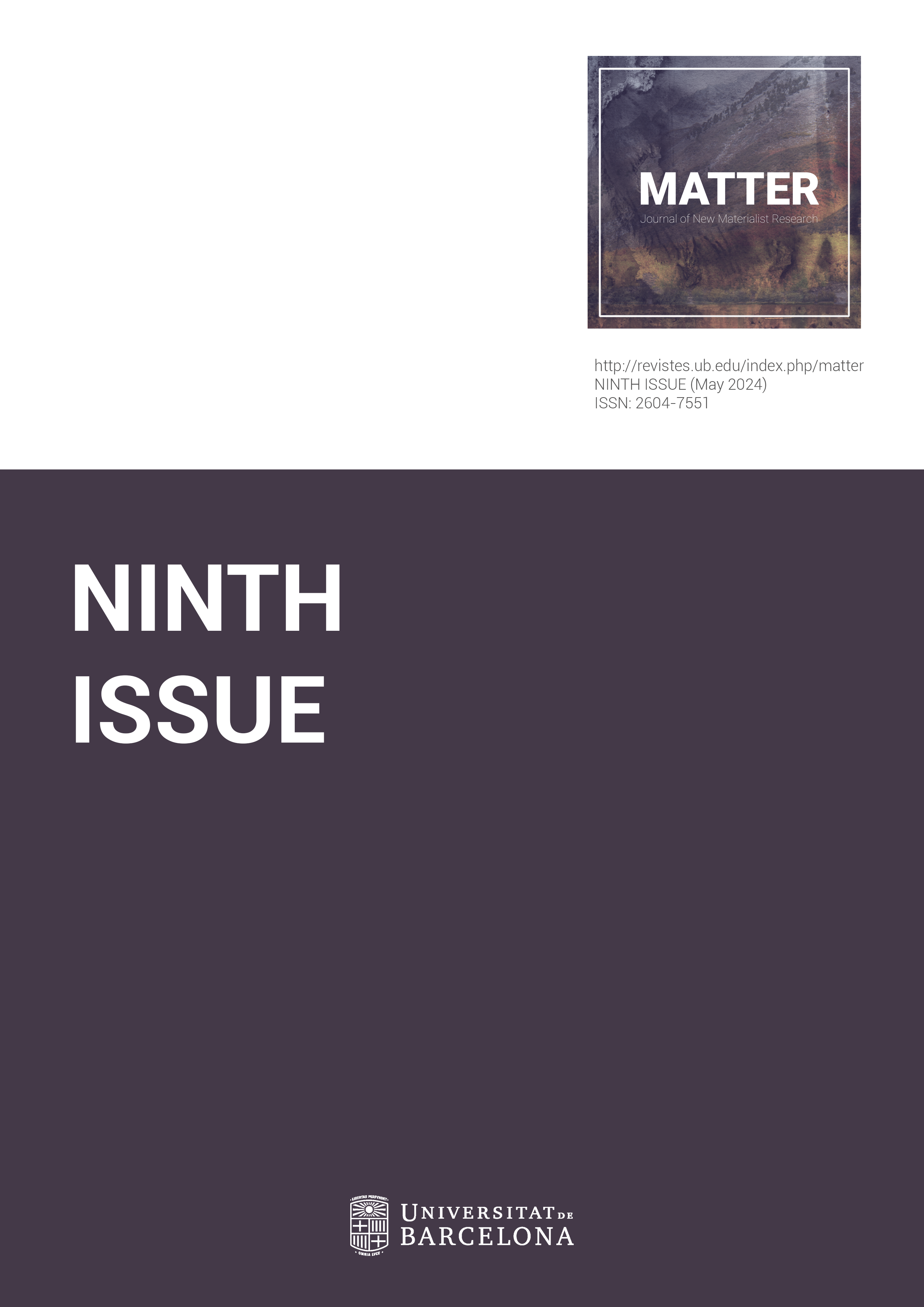What is the Matter with Matter? Barad, Butler, and Adorno
DOI:
https://doi.org/10.1344/jnmr.v9.46426Keywords:
Agential realism; Negative dialectics; Queer feminism; New materialism; Quantum physics.Abstract
This article aims to read feminist new materialisms (Barad), together with ‘postulated’ linguistic or cultural primacy of Queer Theory (Butler), to show how both are engaged in similar critical-ethical endeavours. The central argument is that the criticism of Barad and new materialisms misses Butler’s materialistic insights due to a narrow interpretation of Butler's alleged social-constructivist position. There is, therefore, a specific focus on where they both make similar ethical appeals. Moreover, the article relies on Adorno's negative dialectic to highlight an interpretation of Barad and Butler as being part of the same dialectical movement, in which materialism and idealism fluctuate in their mutual criticisms, thus continuing the procession towards 'new knowledge' and emancipation, or freedom, through their motions back and forth.
Downloads
References
Adorno, Theodor W. (1990). Negative Dialectics. Trans. E. B. Ashton. Routledge.
Adorno, Theodor W. (2005). Minima Moralia: Reflections of a Damaged Life. Trans. E. F. N. Jephcott. Verso.
Adorno, Theodor W. (2005). Progress. In Critical Models: Interventions and Catchwords, trans. Henry W. Pickford (pp. 143–160). Columbia University Press.
Adorno, Theodor W. (2019). Ontology and Dialectics: 1960/61. Trans. Nick Walker. Polity Press.
Adrian, Stine W. (2016). Nymaterielle teorier: Karen Barad [New Materialist theories: Karen Barad]. In Bjørn Schirmer Andersen (Ed.), Kulturteori og kultursociologi [Theory and sociology of culture], Vol. 2 (pp. 77–100). Hans Reitzels Forlag.
Althusser, Louis (1971). Ideology and Ideological State Apparatuses. In Lenin and Philosophy and Other Essays, trans. Ben Brewster (pp. 127–187). Monthly Review Press.
Barad, Karen (1996). Meeting the Universe Halfway: Realism and Social Constructivism Without Contradiction. In Lynn Hankinson Nelson & Jack Nelson (Eds.), Feminist, Science, and the Philosophy of Science (pp. 161–194). Kluwer Academic Publishers.
Barad, Karen (2003). Posthumanist Performativity: Toward an Understanding of How Matter Comes to Matter. Signs: Journal of Women in Culture and Society, 28(3), 801–831.
Barad, Karen (2007). Meeting the Universe Halfway: Quantum Physics and the Entanglement of Matter and Meaning (2nd ed.). Duke University Press.
Barad, Karen (2014). Diffracting Diffraction: Cutting Together-Apart. Parallax, 20(3), 168–187.
Bohr, Niels (1937). Causality and Complementarity. Philosophy of Science, 4(3), 289–298.
Bohr, Niels (1961). The Quantum of Action and the Description of Nature. In Atomic Theory and the Description of Nature: Four Essays with an Introductory Survey (pp. 92–101). Cambridge University Press.
Bray, Abigail, & Colebrook, Claire (1998). The Haunted Flesh: Corporeal Feminism and the Politics of (Dis)Embodiment. Signs: Journal of Women in Culture and Society, 24(1), 35–67.
Butler, Judith (1997). Merely Cultural. Social Text, Autumn/Winter(52–53), 265–277.
Butler, Judith (1999). Gender Trouble: Feminism and the Subversion of Identity. Routledge.
Butler, Judith (2002). What is Critique? An Essay on Foucault’s Virtue. In David Ingram (Ed.), The Political (pp. 212–226). Blackwell Publishers.
Butler, Judith (2004). Precarious Life: The Powers of Mourning and Violence. Verso.
Butler, Judith (2011). Bodies That Matter: On the Discursive Limits of ‘Sex’. Routledge.
Butler, Judith (2012a). Can one lead a good life in a bad life? Radical Philosophy, 176, 9–18.
Butler, Judith (2012b). Subjects of Desire: Hegelian Reflections in Twentieth-century France. Columbia University Press.
Cook, Deborah (2006). Adorno’s Critical Materialism. Philosophy and Social Criticism, 32(6), 719–737.
Dolphijn, Rick & van der Tuin, Iris (2012). The Transversality of New Materialism. In Graham Harman & Bruno Latour (Eds.), New Materialism: Interviews & Cartographies (pp. 93–114). Open Humanities Press.
Favrholdt, David (1993). Niels Bohr’s Views Concerning Language. Semiotica, 94(1/2), 5–34.
Geerts, Evelien & van der Tuin, Iris (2021). Diffraction & Reading Diffractively. Matter, 2(1), 173–176.
Haraway, Donna J. (1992). The Promises of Monsters: A Regenerative Politics for Inappropriate/d Others. In Lawrence Grossberg, Cary Nelson, & Paula Treichler (Eds.), Cultural Studies (pp. 295–336). Routledge.
Hull, Carrie L. (1997). The Need in Thinking: Materiality in Theodor W. Adorno and Judith Butler. Radical Philosophy, 84, 22–35.
Jagger, Gill (2014). The New Materialism and Sexual Difference. Signs: Journal of Women in Culture and Society, 40(2), 321–342.
Kirby, Vicky (2002). When All That Is Solid Melts Into Language: Judith Butler and the Question of Matter. International Journal of Sexuality and Gender Studies, 7(4), 265–280.
Kirby, Vicky (2007). Butler Live. In Judith Butler: Live Theory (pp. 144–158). Continuum.
Kronqvist, Camilla (2021). Tänk på de sammanhang då vi talar om kvinnor: En wittgensteinsk undersökning [Thinking about those contexts where we talk about women: a Wittgensteinian inquiry]. In Evelina Johansson Wilén & Johanna Sjöstedt (Eds.), Vad är en kvinna? Språk, materialitet, situation [What is a women? Language, materiality, situation] (pp. 211–230). Daidalos.
Marx, Karl, & Engels, Friedrich (1975). The German Ideology: Critique of Modern German Philosophy According to its Representatives Feuerbach, B. Bauer and Stirner, and of German Socialism According to its Various Prophets. In Marx and Engels Collected Works Vol. 5, trans. C. Dutt, W. Lough, & C. P. Magill (pp. 19–661). International Publishers.
Meijer, Irene Costera, Prins, Baukje, & Butler, Judith (1998). How Bodies Come to Matter: An Interview with Judith Butler. Signs: Journal of Women in Culture and Society, 23(2), 275–286.
Downloads
Published
Issue
Section
License
Copyright (c) 2024 Philip Højme/Hoejme

This work is licensed under a Creative Commons Attribution 4.0 International License.
The authors who publish in this journal agree to the following terms:- Authors retain copyright and grant the journal the right of first publication.
- Texts will be published under a Creative Commons Attribution License that allows others to share the work, provided they include an acknowledgement of the work’s authorship, its initial publication in this journal and the terms of the license.






